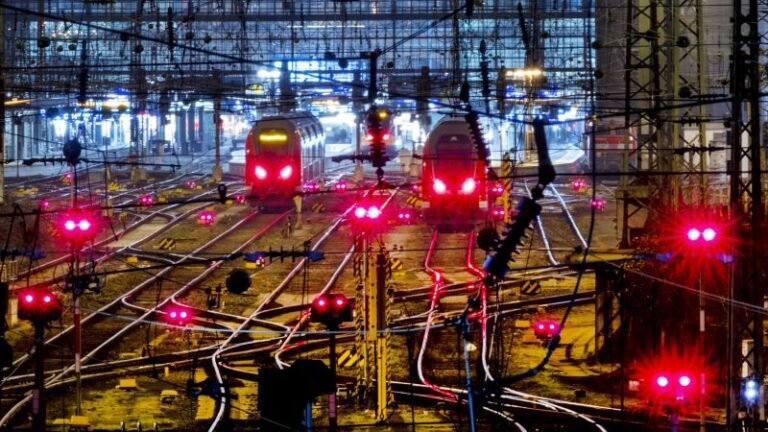Michael Probst/Associated Press
Trains stopped outside Frankfurt Central Station on Wednesday amid a nationwide strike.
Berlin
CNN
—
German commuters faced chaos on Wednesday as the country experienced a three-day national rail strike, adding to travel disruptions in Europe’s largest economy as protesting farmers continued to block roads and highways.
Freight and passenger trains have been affected by a rail strike that has forced major rail operator Deutsche Bahn (DB) to cancel thousands of trains, a Deutsche Bahn (DB) press release said on Wednesday.
The railway company said about 80% of long-distance services would be cancelled, while regional lines would be affected to varying degrees. During the strike, which will last until Friday, rail services will operate on a significantly reduced emergency timetable.
“The strike by the GDL has had a significant impact on train services in Germany. We regret the restrictions and hope that many people who were unable to reschedule their journey will be able to reach their destination,” DB spokeswoman Anja Brücker said in a video message posted on the DB website on Tuesday evening.
Andreas Rentz/Getty Images
Travellers look for information at the Deutsche Bahn ticket machine at Cologne’s main railway station.
DB said the strike would affect the travel plans of millions of passengers and urged people to postpone or cancel all non-essential trips.
This is the third and largest strike by drivers since their union began negotiations with DB and other companies in November last year. Germany’s GDL union is demanding a reduction in working hours from 38 to 35 hours a week for shift workers, a wage increase of $606.62 (€555) a month and a one-off inflation bonus of €3,000.
DB offered flexibility in working hours, but refused to reduce working hours without reducing wages.
The nationwide rail strikes come as German farmers vow to intensify their nationwide protests against the government’s planned cuts to fuel subsidies.
Since the beginning of the week, farmers have blocked many roads and highway entrances across the country with their tractors, and have also staged marches in cities and towns, causing significant traffic disruption.
Protests saw several hundred agricultural vehicles descend on the German government district at Berlin’s famous Brandenburg Gate on Monday.
The German government hopes the cuts it announced in December will save 920 million euros ($1 billion), according to German public broadcaster Deutschlandfunk.
A German government spokesman said at a news conference on Monday that the government does not plan to change its plans despite the protests.
Last week, a group of German farmers tried to express their anger by preventing Economy Minister Robert Habeck from getting off a ferry in northwest Germany. Habeck, who was traveling on a private ferry, was trapped on the vessel for several hours.
Farmers’ Association President Joachim Röckweid condemned the incident and described blockades of this kind as “unacceptable” in a press release issued on Friday.
A demonstration in cooperation with the German shipping industry has been announced for January 15 in Berlin, while multiple protests are planned across the country.
Authorities have expressed concern that the far-right Alternative for Germany party is exploiting the farmers’ protests to further its own agenda.
CNN has seen footage of convoys of tractors and trucks, some decorated with protest banners and stickers from the far-right Alternative for Germany (AfD) party. AfD banners hung on tractors protesting against vehicle subsidy cuts read “Our farmers first” and “Germany needs new elections.”
On social media, the leader of the controversial AfD party in the eastern German state of Thuringia, Björn Höcke, issued an appeal on his Facebook page: “Citizens, we will see you on the roads!”
The politician has been classified as an extremist by Germany’s Office for the Protection of the Constitution.
The Alternative for Germany party, which is at record highs in opinion polls and is currently consistently higher than the three ruling parties in Germany’s coalition government, is hoping to make big gains in three local elections this year.
But the AfD itself calls in its election manifesto to abolish support for farmers, and at the same time supports the protest, using it as evidence of Germans’ dissatisfaction with Chancellor Olaf Scholz’s coalition government.
CNN’s Ankie Kappeler and Niamh Kennedy contributed to this report.





